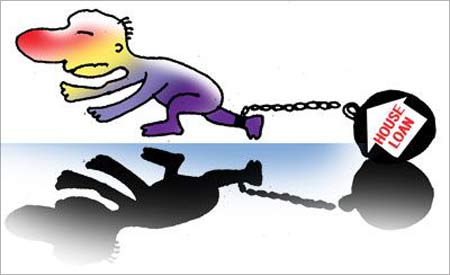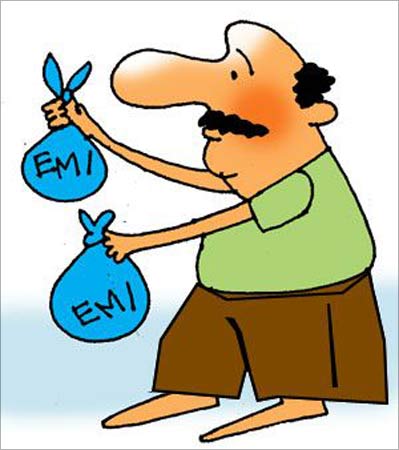 | « Back to article | Print this article |
Home loan tax exemption may be raised
The government is trying to encourage lending to breathe fresh life into the real estate and banking segments, which are currently coping and bouncing back from the ill effects of a realty market crash and global recession.
One of the possible ways the government could opt to do this is by including a recommendation for increasing the tax slab for home loans in the upcoming Budget announcement slated for July 6, 2009.
This will favour the person opting for a new home loan and will specifically be for the tax concessions on the interest rate. Currently, taxpayers opting for housing loans get income tax exemption on interest payment of up to Rs 1.5 lakh (Rs 150,000) per year.
Sources indicate that the income tax exemption limit for interest payment of home loans is likely to be increased to Rs 2.5 lakh (Rs 250,000) for the upcoming year.
BankBazaar.com is an online marketplace where you can instantly get loan rate quotes, compare and apply online for your personal loan, home loan and credit card needs from India's leading banks and NBFCs.
Copyright 2008 www.BankBazaar.com. All rights reserved.
Home loan tax exemption may be raised
The background
The Reserve Bank of India has been trying to revive the lending scenario to try and keep the liquidity crunch at bay. The RBI has cut the repo rate by 425 basis points (4.25 per cent) and reverse repo rate by 275 basis points (2.75 per cent) since September 2008. Responding to these cuts, public sector banks and private banks too have responded with interest rate cuts.
Even builders, although very reluctantly, have started to bring down the property prices. However, the pace of reduction in real estate prices is so slow that it does not match consumer expectations.
People are also very wary of new debt commitments at this point and the reluctance is obvious from the fact that despite cuts in lending rates, people have not been very forthcoming in taking new home loans.
A wait-and-watch approach is being adopted by people to see what level do property prices drop to.
BankBazaar.com is an online marketplace where you can instantly get loan rate quotes, compare and apply online for your personal loan, home loan and credit card needs from India's leading banks and NBFCs.
Copyright 2008 www.BankBazaar.com. All rights reserved.
Home loan tax exemption may be raised
Understanding the interest component of your EMI
Let us analyse how this increased tax sop will be useful for the common man. For this, you need to understand how the concept of the EMI works.
EMI, or equated monthly installment (EMI), is the amount of money that is paid back to the lender on a monthly basis.
This EMI is essentially made up of two parts: the principal amount and the interest on the principal amount divided across each month in the loan tenure. It is always paid to the bank, or the lender, on a fixed date each month until the total amount due is paid up during the tenure.
Now, you might assume that the equal parts of the principal and interest is repaid to the financial institution every month. However, this not the case.
During the initial years the interest component repaid is higher and during the latter years of repayment the principal component is higher. So, if you think you have paid half of the amount borrowed from the bank in 5 years in a 10-year loan tenure, that would not be the case.
You would probably have reduced the total interest component due considerably and would have only repaid the interest component.
BankBazaar.com is an online marketplace where you can instantly get loan rate quotes, compare and apply online for your personal loan, home loan and credit card needs from India's leading banks and NBFCs.
Copyright 2008 www.BankBazaar.com. All rights reserved.
Home loan tax exemption may be raised
An example to explain how the repayment of your EMI reduces your loan amount during the repayment period leading up to the end of the loan tenure can be seen here.
In the example provided, the loan amount taken is Rs 20 lakh (Rs 2 million), which is lent at a interest rate of, say, around 12 per cent, over a loan tenure of 20 years (240 months).
The monthly EMI is calculated at the annualized rate of 12 per cent and amounts to Rs 22,022 per month with the total interest component amounting to Rs 32.8 lakh (Rs 3.28 million).
You will notice from the example provided that the interest repaid decreases with each passing month starting at Rs 20,000 from the first month and the principal repaid increases with each passing month starting from Rs 2,022 from the first month.
This means that the interest component will be the greater portion of the EMI, which will reduce leading up towards the end of the loan tenure, while the reverse is true for the principal component.
BankBazaar.com is an online marketplace where you can instantly get loan rate quotes, compare and apply online for your personal loan, home loan and credit card needs from India's leading banks and NBFCs.
Copyright 2008 www.BankBazaar.com. All rights reserved.
Home loan tax exemption may be raised
How will the possible tax sop help?
Taking into account the fact that the interest outgo of your home loan will be the highest in the initial years of your home loan repayment, this tax sop will be highly useful for salaried individuals looking to obtain a home loan in the upcoming months.
Apart from allocating a portion of money towards the EMI for the loan repayment, balance other budgetary needs like children's education, household expenses, investment needs, medical expenses, etc., a salaried individual also needs to pay a monthly tax outgo as well by way of TDS (tax deducted at source).
The possibility of increasing the tax sop on the interest component of the EMI can provide welcome relief for people planning to take up a home loan as an additional sum of money can now be exempt from tax.
In the example provided it is clear that in the first five years there will definitely be a tax outgo that exceeds Rs 200,000. In such a scenario, this increase in tax rebate will help with the higher interest outflow in the initial years.
BankBazaar.com is an online marketplace where you can instantly get loan rate quotes, compare and apply online for your personal loan, home loan and credit card needs from India's leading banks and NBFCs.
Copyright 2008 www.BankBazaar.com. All rights reserved.
Home loan tax exemption may be raised
Is the tax sop useful for existing home loan borrowers?
The tax sop covering the interest rate would certainly favour the new home loan borrower. However, at this point when people are struggling to meet the existing loan commitments an increased tax rebate on the principal component would have greatly helped home loan borrowers who are in the middle of the their loan repayment.
From the example provided, it is also clear that home loan borrowers who are half way through their loan repayment or towards the end of their tenure might find an increased tax rebate on principal repaid highly useful.
However, the attempt is more focussed towards encouraging a more active lending process, as that is seen as the need of the hour to bring the realty market back on its feet. Also, there is speculation amidst the potential home loan borrowers regarding how long these benefits such a interest rate cuts and tax sops will last, as home loans are long-term commitments that last to the tune of 20 years.
They feel once the markets show signs of improvement, interest rates and property prices could see an upward swing and this could become a bottleneck for their monthly budget a few years down the line.
This leads one to think that the real solution lies elsewhere. In this respect more affordable property prices and issues like job security will be the real key in turning around the markets and accelerating the pace of home purchases. Everything else seems to be falling in place except for that aspect, which is not at the expected levels yet.
Currently the scenario seems to indicate that only if that happens will things change dramatically in the lending scenario!
BankBazaar.com is an online marketplace where you can instantly get loan rate quotes, compare and apply online for your personal loan, home loan and credit card needs from India's leading banks and NBFCs.
Copyright 2008 www.BankBazaar.com. All rights reserved.





